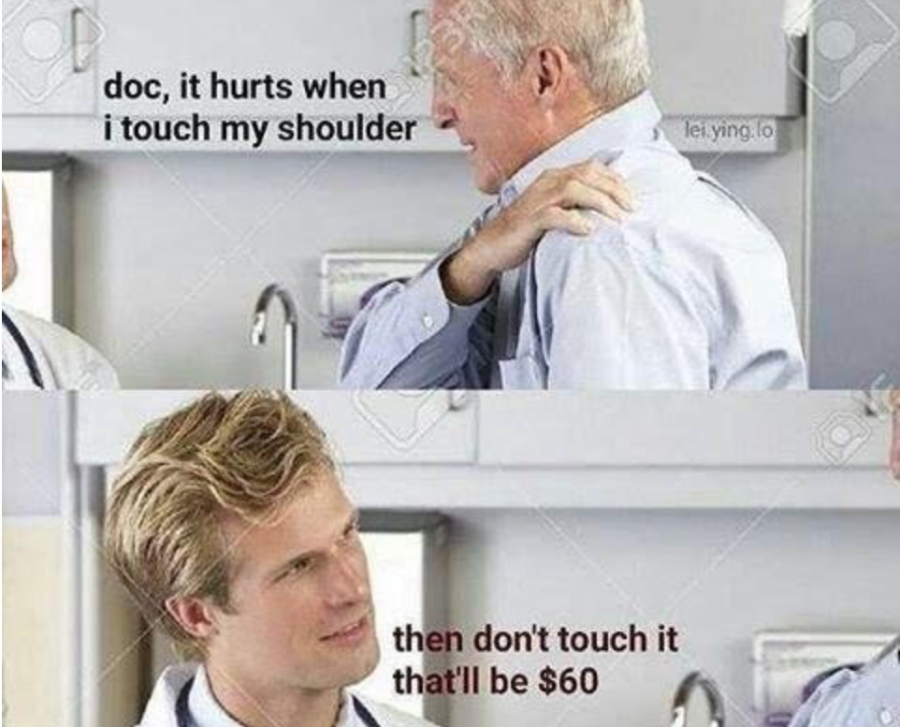Coronavirus Sheds Light on America’s Poor Healthcare System
April 10, 2020
In these unstable times when testing and medical treatment is critical to the defeat of the coronavirus, there must not be anything that, even to a miniscule degree, impedes people from getting tests or medical treatment when necessary or possible. But there is: medical bills.
The US healthcare system, a unique system among advanced industrialized countries, has been under harsh criticism for being terribly expensive and, at the same time, incredibly inefficient—two qualities that should never go to together. According to an article published by The Brookings Institution, “The United States spends more than other countries without obtaining better health outcomes.” This statement is basically an indication of the need for reform and change, effort for which has already resulted in Medicare, Medicaid, and the Affordable Care Act. However, despite those efforts, according to federal data, in 2018, 8.5 percent of all Americans, which is 27.5 million people, were never insured throughout the whole year, and this population mostly consists of low-income families.
Personally, I was incredibly shocked by the costs of my brother’s medical bills when he got an x-ray recently in the US. Living in Korea, where a universal healthcare system is implemented, the cost of an x-ray is usually about $10 with insurance and $40-$50 without. In the US, it was $50 with insurance, $1,500 without. This shows how medical bills are a burden for those uninsured. After blinking my eyes at the bill, I did an Internet search and was enlightened about the whole healthcare problem in the US, which has apparently been going on for ages. And, from a foreigner’s perspective, frankly, it was quite surprising news that healthcare was not guaranteed to all citizens as a right in such a developed country.
America’s imperfect healthcare system sets off a red light during these chaotic times in the midst of a pandemic. There have already been dire consequences from this system where clinics and hospitals prioritize insurance status over everything, their first question to a patient being, “Do you have insurance?”: an uninsured 17-year-old in Los Angeles who died from COVID-19 was denied medical care from an urgent-care center and was advised to seek a public hospital. It is utterly outrageous that a patient’s ability to afford medical care is being prioritized over their health. Yes, caring for an uninsured patient is certainly not a wise choice for the health care facility, but it conflicts with moral and ethical values that human health comes first. This is where, I believe, man-made laws and systems conflict with our own humanitarian values. Ideas, concepts, and laws that we have made for the prevention of disorganization and benefit of humanity in turn deter us from acting according to the best of our instincts and values. This is an incredibly ironic situation.
Another fatal pitfall of the US healthcare system that is being given the spotlight due to the current pandemic is that roughly half of Americans rely on their employers, or their employment status, for health insurance, and because of these massive closures, employers are forced to minimize the working populations and lay off workers. On Thursday, March 26, it was reported that a record 3.3 million Americans filed for unemployment due to the pandemic. As of last week, that number doubled. During this pandemic, people are losing jobs and their medical coverage. When medical care is the most needed thing in the world, people are losing it. Another incredibly ironic situation. But the shock does not end here, as another article slides past the eye, titled: “Total Cost of Her COVID-19 Treatment: $34,927.43.” This is how much a COVID-19 treatment would cost for an uninsured individual. It seems as if this pandemic is yet again shedding light on the many deep, dark pits that exist in the US healthcare system, which is supposed to be a safeguard for Americans seeking medical care in times of need.
Let this be an opportunity to rage over the current weak healthcare system and a stimulus to dismantle and rebuild it to be dependable and comfortable one once and for all.

















































































































































